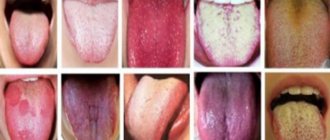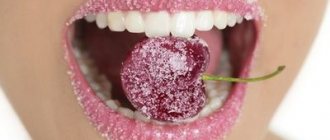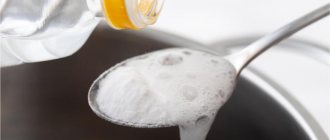Where does the bitter taste come from?
An unpleasant taste may be present constantly or appear periodically. This symptom is associated with the release of bile into the esophagus. Patients often notice a bitter taste in the mouth in the morning, especially when eating fatty foods the day before and after sleeping on the left side.
Bile is a liver secretion that is involved in digestion. The fluid flows through the ducts into the gallbladder and from there into the duodenum. Normally, bile does not flow into the esophagus, and the person feels well.
After eating certain types of food, the liver may react by producing more secretions. The volume of bile in the intestines increases, and a small part enters the esophagus, causing a bitter taste in the mouth. The same reaction occurs when using certain medications or when exposed to other factors. In any case, an unpleasant taste is a reason to consult a doctor. Only by identifying the cause of bitterness in the mouth can a person’s well-being be improved.
Treatment of bad breath
If you experience one or more of the symptoms described above, you should consult a doctor. Regardless of the nature of the smell and the results of self-observation, it is better to consult several specialists in parallel. Since bad breath can be caused by a wide range of diseases, it is best to take decisive action to determine the causes.
The first medical specialist you need to visit is the dentist. Based on the results of the initial examination, assessment of the current state of health of teeth, gums and hardware testing of bad breath, the doctor will make a conclusion about the possible causes of bad breath.
If the diagnosis shows purely dental reasons, treatment should be started immediately, according to the schedule developed by the doctor. If during the examination no signs of dental diseases and pathologies were revealed, the current state of health of the teeth and gums could not provoke the appearance of an unpleasant odor, the patient is referred for a consultation to other specialist doctors, for example, a gastroenterologist, endocrinologist, or otolaryngologist. Our dentistry is located in the same building as the multidisciplinary clinic “Diamed”, where you will be consulted by all the listed specialists at a time convenient for you.
At the dentist’s appointment, try to describe the situation in as much detail as possible: how long ago did you notice the unpleasant odor, how did it happen; if there are additional symptoms besides the smell - coating on the tongue, taste, etc. – be sure to tell us about it; notify the doctor about the results of self-observation - when the smell is especially active, whether its intensity changes throughout the day depending on food intake, etc. It will also be important to mention recent treatment or ongoing use of any medications. Don’t be shy about the dentist, this is the doctor who will get rid of bad breath!
Possible causes of bitterness in the mouth
Diseases of the biliary tract
Bile transport in the body is disrupted in chronic cholecystitis, cholelithiasis, biliary dyskinesia, hepatitis, and cirrhosis. Spasm or blockage of the duct leads to stagnation of secretions.
Important!
Bitterness in the mouth after eating can occur even after removal of the gallbladder. The reason is that bile is constantly produced in the body, and if a person does not adhere to a diet after surgery, some of the liquid may be thrown into the esophagus. You won’t be able to get rid of the bitter taste without following a diet.
Digestive system diseases
Diseases of the liver, esophagus, stomach, and intestines are accompanied not only by constant bitterness in the mouth, but also by other characteristic symptoms:
- nausea, vomiting;
- severe heartburn;
- belching;
- constipation or diarrhea;
- pain in the epigastric region.
The symptom of bitterness in the mouth can accompany giardiasis, gastritis, duodenitis, peptic ulcer, etc.
Other pathologies
Various oral conditions can cause a bitter taste:
- diseases of the tongue and gums: gingivitis, stomatitis, glossitis;
- insufficient oral hygiene;
- incorrectly installed fillings and dentures.
A bitter taste in the mouth may appear when taking certain anti-inflammatory, antihypertensive, anticonvulsant, hypnotics, and antibiotics. The same symptom is accompanied by poisoning with copper, mercury, lead, and the development of cancer pathologies. Severe bitterness in the mouth can be a reaction to taking herbal remedies: decoctions and infusions of herbs, nuts, sea buckthorn oil.
What is the smell of your mouth?
If you find yourself with bad breath and are in doubt about which doctor to contact first, try to assess the nature of the smell, its intensity, taste, time of onset or exacerbation.
Hydrogen sulfide odor from the mouth
A hydrogen sulfide smell usually indicates disturbances in the digestive process. Especially if after eating there is belching, bloating, nausea, vomiting, abdominal pain, etc. Also, people with an unpleasant hydrogen sulfide odor are characterized by the appearance of a white coating on the root of the tongue, regardless of food intake and oral hygiene procedures. Most often, patients with these symptoms have gastritis or peptic ulcer due to increased acidity of gastric juice.
Sour breath
Sour breath also indicates gastroenterological diseases. Typically, a sour smell appears in the early stages of gastritis and is often the only symptom of the disease.
Bitter breath
A bitter odor and a bitter taste in the mouth, regardless of the time of day and food intake, may indicate liver and gallbladder diseases. Often an additional symptom is the appearance of a yellow coating on the tongue, despite hygiene procedures. If the disease is in the early stages of development, there may be no other symptoms other than an unpleasant odor and plaque. Over time, digestive disorders, general deterioration in health, pain in the side, etc. are possible.
Smell of acetone from the mouth
The smell of acetone and a sweetish taste most often indicate endocrine disorders, in particular the development of diabetes mellitus. Considering the fact that in many cases diabetes is asymptomatic and is detected in the patient when critical pathologies are identified, timely contact with a doctor when the smell appears can protect you from serious illness.
Ammonia and putrid odors
Ammonia-like breath is an indicator of a disease of the genitourinary system, usually the kidneys or bladder. A pungent putrid odor is a typical manifestation of dental diseases: diseases of the teeth and gums, depending on the degree of development, can be characterized by a sharp unpleasant odor. Often, with dental diseases, a white or yellowish coating on the tongue may be observed.
What to do if you have a bitter taste in your mouth
The first thing you need to do is make an appointment with a gastroenterologist as soon as possible. The doctor will conduct a diagnosis and find out why bitterness and dry mouth occur and how to get rid of these sensations.
At the first consultation, the doctor interviews the patient. It is necessary to establish the period of maximum manifestation of symptoms. For example, increased bitterness in the mouth after eating may indicate overeating or disease of the bile ducts. If an alarming sign appears after taking medications, then most likely there is a violation of the intestinal microflora or a negative reaction of the liver. Bitterness in the mouth can occur in the morning or evening, after drinking alcohol, physical activity, and be accompanied by dry mucous membranes. All manifestations must be reported to your doctor.
What Causes Bad Breath
Only a doctor can definitely determine the cause of bad breath. It is worth understanding that smell is not an independent phenomenon, but only a symptom of a disease or a manifestation of pathology. Ignoring an unpleasant odor or trying to deal with it on your own, without consulting a doctor, usually leads to the development of the disease. And if in the early stages of the disease bad breath may be the only manifestation of the pathology, then later new symptoms may be added to it.
Often, an unpleasant odor indicates the beginning of the process of tooth decay, while the patient does not feel pain or discomfort in the early stages. That is why we recommend visiting your dentist at least twice a year for a preventive examination and hygienic teeth cleaning. Proper regular hygiene and monitoring of your teeth and gums by a specialist will ensure your breath is fresh. Make an appointment with the dentist now, even if nothing bothers you, do not wait for others to react to your bad breath, because it is very unpleasant. Registration is made by calling 8 or through the registration form located on the website.
Improper or lack of oral and dental care
If hygiene is not observed in the oral cavity, natural processes begin - food debris serves as a substrate for actively multiplying bacteria, the waste products of which cause an unpleasant odor. This problem is especially relevant for children and adolescents, who often neglect brushing their teeth, as well as people in certain professions with limited freedom of movement and hygiene conditions (drivers, truckers, etc.).
Inflammatory, infectious or viral diseases
Diseases of various body systems can cause bad breath: otolaryngological diseases - tonsillitis, tonsillitis, sinusitis, sinusitis, etc.; gastroenterological diseases - gastritis, peptic ulcer, cholecystitis, dysbacteriosis, etc.; Dental diseases are any processes of destruction of tooth enamel or bone tissue. Often the cause of an unpleasant odor is a whole complex of diseases of various systems of the human body.
Frequent or chronic eating disorders
With constant consumption of harmful or difficult-to-digest foods, digestive disorders often develop, and as a result, gastroenterological diseases. Overeating or poor diet also contributes to disruption of digestive processes.
Bad breath from smokers
Tobacco smoking causes disturbances in the functioning of the oral mucosa, changes the qualitative composition of saliva, contributes to tooth decay and the development of many diseases. Even the use of various hygiene products for oral care in the case of smoking has only a temporary effect.
Expert advice
When there is bitterness in the mouth, self-medication is the most dangerous. It is believed that the main cause of the symptom is liver disease. Patients begin to make compresses on their own and drink herbal decoctions. Instead of relief, complications occur. The patient is sent to the hospital with severe pain, intoxication, peritonitis, etc. These are the consequences of trying to make an independent diagnosis. It turns out that the cause of the bitterness in the mouth was gallstones. A person independently drinks choleretic decoctions, stimulates the migration of stones, which safely get stuck in the duct and cause an acute attack. Instead of having the crystals crushed under medical supervision, the patient goes straight to the operating table.
Dzhgarkava Tea Gochaevna
Therapist-cardiologist Experience 5 years
There are other, no less dangerous cases. To get rid of bitterness in your mouth, you need to go to the doctor and cure the detected diseases. This is the only right decision.
Haunting sweetness
The sweetness that spreads in your mouth from just eating a cake is a very pleasant sensation.
But, if a person’s saliva continues to be sugary, even after herring, even after jellied meat with horseradish, it’s worth thinking about. The reasons for the appearance of a constant sweetish taste in the mouth may be: Article on the topic First Aid. How to act in case of poisoning before doctors arrive
poisoning with chemicals (for example, pesticides or phosgene) - if, in addition to a sweet taste, a person feels weak and unwell and understands that he may have had contact with poisons, he should immediately consult a doctor;
changes in carbohydrate metabolism in the body and impaired insulin production - with a lack of insulin in the blood, sugar accumulates in the blood and lymphatic fluid, penetrates into saliva and it becomes sweet. Therefore, the first thing you should do when a persistent sweet taste appears is to contact an endocrinologist and donate blood for sugar. This is how diabetes mellitus can manifest itself. A sweet and sour taste in the mouth, especially in the morning, also accompanied by frequent heartburn, often occurs with problems with the pancreas, in particular with pancreatitis;
nerve damage, including infectious and viral - take a general blood test;
stress, depression - when a person’s life is unsweetened, stress hormones begin to actively work in his body, which lead to an increase in blood glucose levels. In this case, the taste appears briefly immediately after psycho-emotional shocks;
respiratory tract infections and some dental diseases caused by Pseudomonas aeruginosa - these bacteria are capable of secreting sweet substances;
smoking – or rather, a recent cessation of this habit.
Metallic taste in the mouth of people of different sexes
A number of reasons that cause the sensation of metal are divided by gender.
For men who work in mining or in industries that use heavy metals, an iron taste may appear during each shift and disappear after the end of the shift. Long-term wearing of massive metal objects (bracelets, watches) also leads to a similar result, since during prolonged contact with the skin the concentration of ions entering the blood through the pores becomes too high.
Women may experience a metallic taste due to:
- pregnancy. Many expectant mothers note that a metallic taste periodically appears during pregnancy. Why does this happen? Firstly, the matter may be a lack of microelements and vitamins, and secondly, changes in hormonal levels and malfunctions in the functioning of receptors that recognize taste can be to blame;
- the use of weight loss drugs and various biological additives, which often leads to poisoning due to incorrect dosages and the desire to quickly get the most pronounced result possible;
- insufficient amount of fluid consumed (women resort to this remedy to lose weight and get rid of swelling). A metallic taste is one of the signs of dehydration.
It is best to start combating this not very pleasant feeling by visiting a doctor who will prescribe the necessary tests and examinations. Otherwise, you can look for reasons on your own and continue to experience discomfort regularly for a very long time.
Diagnostic measures
Before starting a course of treatment and getting rid of an unpleasant symptom, you need to undergo a diagnosis.
Keep in mind! The set of diagnostic measures includes the following:
- General and biochemical blood test. With its help, the presence or absence of an inflammatory process in organs and tissues is revealed, and internal bleeding is excluded;
- stool analysis. Determine the presence of parasites and intestinal infections in the body;
- Ultrasound. During the examination, the structure and size of the internal organs are visible, which makes it possible to determine deviations;
- determination of the acidity of gastric juice. The probing method is used for research, in which secretions are taken or the PH metric method;
- fibrogastroduodenoscopy. The method is aimed at identifying more detailed information about the quality indicators of the mucous membrane of the stomach and intestines;
- CT.
Why there is an iron taste in the mouth: reasons not related to disease
If you notice an iron taste in your mouth, you should not immediately panic: there is a possibility that the unpleasant sensation is not associated with diseases.
It may appear due to:
- drinking mineral water with salts (often this product is enriched to compensate for iron deficiency in the body);
- drinking low quality drinking water (for example, supplied to the home through old rusty pipes);
- tongue piercing (the sensation appears as a result of the metal reacting with certain foods);
- using cast iron and aluminum cookware when preparing and eating food.
Treatment and elimination of symptoms
A set of therapeutic measures is selected depending on the pathology after diagnostic procedures .
It is worth noting! The goal of treatment is not only to eliminate the symptom itself. First of all, it is important to get rid of the pathology that caused the taste of eggs in the mouth.
Medications
As for medications , the following drugs are used depending on the disease:
- for dysbiosis, medications from the class of probiotics are used , for example, such as Hilak Forte and Linex;
- in situations with constipation, laxatives are used (they must be prescribed by a doctor), as well as enemas with olive or vaseline oil ;
- if the cause of bad breath is a lack of digestive enzymes Mezim Forte and Festal are taken ;
- the process of producing bile in the body , then Allochol or Holosas ;
- for stomach ulcers or gastritis, Almagel and analogues are used ;
- if there is a bacterial infection , then you will need to take a course of Amoxicillin and Phthalazol ;
- if there are parasites use Levamisole, Metronidazole and other similar drugs.
Important! Under no circumstances should you self-medicate if you have a smell of rotten eggs coming from your mouth. Medicines are prescribed only by a doctor after proper diagnosis.
Diet
It happens that the taste of rotten eggs in the mouth appears due to food poisoning. In such a situation, to get rid of the symptom you will need to do a gastric lavage.
In order to provoke a gag reflex, you can prepare a weak solution of soda and drink it in small sips.
After gastric lavage, you need to take any sorbent.
As for directly eliminating the symptom , you can get rid of it yourself at home.
First of all , you should pay attention to the daily menu and adjust your diet. Low acidity is eliminated by consuming :
- fermented milk products;
- meat;
- fish;
- vegetables You can make a beet or turnip salad.
Keep in mind! To eliminate the symptom, you need to exclude the following foods from your diet:
- alcoholic products;
- citrus;
- plums, cherries;
- legumes;
- milk products;
- cabbage, squash, zucchini;
- bread.
When the smell of rotten eggs appears in the mouth, eat food 5 times a day in small portions. strictly not recommended to fast for “accumulation of acid”, as well as to overeat.
Folk recipes
You should know! At home, you can use the following methods to get rid of the smell of rotten eggs from your mouth:
- herbal decoctions (melissa, chamomile, yarrow). Infusions of raspberry leaves, rosehip or sea buckthorn, as well as St. John's wort and lingonberry, give a good effect. These herbs can be purchased at the pharmacy and prepared according to the attached instructions, or 1/2 teaspoon of herbal raw materials, pour 300 ml of boiling water and leave for 15 minutes;
- take general strengthening agents, for example, vitamin-mineral complexes . It is useful in such a situation to drink mineral water;
- soda solution. To quickly get rid of an uncomfortable symptom, you will need to prepare a weak soda solution. Dilute 1/2 teaspoon of the substance in 250 ml of water and drink in small quantities when hydrogen sulfide belching occurs;
- eggshell. For this remedy, you will need to boil the eggs for 20 minutes, peel them, remove the film from the shell and grind the shell into powder. Take 1/2 teaspoon three times a day. The product should be washed down with clean water;
- mint tincture. The product can be purchased at a pharmacy and taken 15-20 drops with meals.








